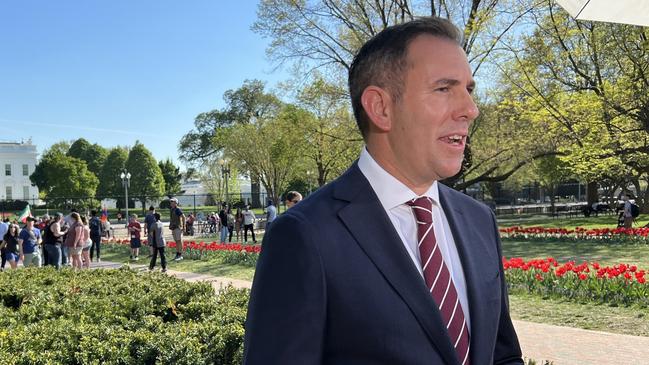Jim Chalmers: ‘Can’t clean this big a mess up in one or two budgets’
Jim Chalmers hoses down expectations for a federal budget surplus for years given growing spending pressures from rising public debt interest payments and other costs.

Jim Chalmers has hosed down expectations for a federal budget surplus for years because of growing spending pressures from rising public debt interest payments alongside rising disability, health, aged care and defence costs.
The Treasurer, who is holding 18 meetings in Washington on his two-day trip with senior officials from around the world, including US Treasury Secretary Janet Yellen, said budget pressures were likely to “intensify rather than ease” in coming years, painting a bleak outlook for fiscal repair.
“We are realistic about our ability to quickly turn this ship around,” he told The Australian, baulking at providing a timeframe for returning the budget to surplus and flagging a “multi-budget effort”.
“You can’t clean up a mess this big in one or two budgets, it will take a number.”
The October budget update pencilled in a $44bn budget deficit for the 2024 financial year, which would mark the 16th annual budget deficit in a row since the late 2000s, when the global financial crisis derailed the Rudd government’s plans for a surplus.
The latest IMF statistics, released this week, forecast Australia’s gross public debt, which includes state debt, will have surged to 62.4 per cent of GDP by 2024, up from 46.7 per cent in 2019, largely a result of measures to keep the economy afloat during pandemic restrictions.
Federal net debt, a narrower measure, jumped from $373.5bn in June 2019 before Covid-19 emerged in early 2020, to a forecast $572.5bn this June, according to the latest budget papers, fuelling a surge in interest repayment costs as global interest rates rise to combat inflation.
Fresh from G20 finance ministers meetings, Mr Chalmers also ruled out indexation of income tax thresholds, which occurs automatically in some nations, in lights of higher levels of inflation, which were increasing taxpayers’ average tax rates at a higher than normal pace.
“We haven’t been contemplating or costing an automatic indexation,” he said, while stressing the government had no intention to alter the legislated stage three tax cuts due to take effect next year.
“Obviously, they are a point of contention in the public conversation about the budget but our focus is modest but meaningful changes to super tax breaks and taxation of multinationals”.
Mr Chalmers bristled at criticism that he wasn’t sufficiently interested in structural reform, pointing to a “much more substantial effort than our predecessors [including] savings of $22bn found in the last budget” in October. The Treasurer singled out the Biden administration’s extensive new subsidies for renewable energy projects, including in the US Inflation Reduction Act, and for boosting semiconductor manufacturing.
“We’re trying to work out how we make sure that we are the beneficiaries are not the victims are the hundreds of billions of dollars that countries like the US are spending on their industrial base, particularly when it comes to energy,” he said.
In his meetings earlier with G20 finance ministers Mr Chalmers made a point of contrasting Australia’s relatively prudent bank regulations in terms of capital adequacy, a noteworthy topic given a series of bank failures in the US that prompted local regulators to guarantee deposits beyond an existing $US250,000 threshold.





To join the conversation, please log in. Don't have an account? Register
Join the conversation, you are commenting as Logout